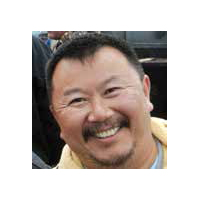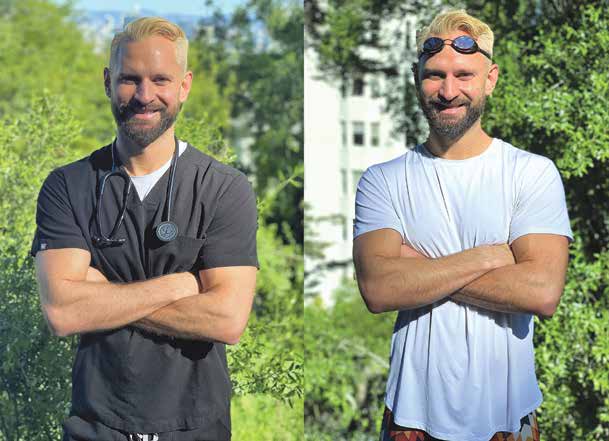
By John Chen–
“We are truly working on the frontlines of this pandemic. We are the gatekeepers for patients admitted into the healthcare system. Oftentimes, we are people’s only means to access much needed lifesaving medical care.”
—Dr. Kevin Masek
I met Dr. Kevin Masek, an emergency room (ER) physician in San Francisco, several years before the pandemic playing volleyball with an LGBT group on a sun-kissed day at Lake Merritt in Oakland. Over the years, I learned that Dr. Masek is quite an accomplished athlete who has medaled in several sports including swimming and volleyball.
“My very first sport should have been gymnastics because my babysitter taught me how to do a cartwheel when I was three. But, alas, my career in gymnastics ended before it began because my parents said it was too expensive,” Dr. Masek revealed with a chuckle. “Instead, my first sport was soccer and then I [forayed] into basketball, baseball, swimming, diving, tennis, track. You name it. In high school I was a multi-sport varsity athlete, and in college I competed in intramural swim meets. As an adult, I started playing and loving volleyball on all surfaces, indoor, grass and beach.”
A true scholar-athlete, Dr. Masek became a medical doctor because he ultimately wanted to make a difference and save lives.
“I initially thought I wanted to be a pediatrician because I loved working with kids,” he told me for the San Francisco Bay Times. “In medical school, I came to enjoy and appreciate the breadth of scope that Emergency Medicine provided. I was especially drawn to the fact that Emergency Medicine doesn’t turn anyone away and truly serves the underserved, people who have little or no access to proper healthcare.”

“I loved the team and family environment in the emergency department,” Dr. Masek continued. “Oftentimes, we encounter people who are scared, stressed, and having one of the worst days of their lives. Every staff member plays an important role. Working together, the emergency department can make huge, lasting impacts on people’s lives. We are here 24 hours a day, 365 days a year.”
During our chat, Dr. Masek’s tone turned more somber and concerned when he segued to the current pandemic.
“The last couple of years have been extremely stressful,” he said. “I think we can easily argue that our specialty has been among the most courageous as we managed and cared for all the patients. Despite the risks, we had a responsibility to help people. In the beginning of the pandemic, we had little knowledge about COVID-19 and how dangerous this virus could be to us and the loved ones we were in physical contact with. Our medical knowledge regarding COVID-19 was changing every day.”
“On the first day of the lock down,” he recalled, “I had to intubate (place a respirator) a critically ill patient due to severe lung damage from COVID. At that time, in Asia, many clinicians that were in the room during intubation contracted COVID. I was terrified after that procedure that me or my staff may contract COVID while attempting a lifesaving procedure.”
He added, “I don’t think the general public understands that only certain rooms in the ER are safe enough to help prevent the spread to staff or other patients. Our emergency department team had to quickly adapt and come up with safety protocols and procedures for the mass influx of COVID patients. Many of my colleagues faced extreme fear of passing COVID on to their loved ones and did not see them for long periods of time. This pandemic has caused so much burnout in the emergency department and healthcare in general.”
“People in the medical field worked tirelessly for long hours, sacrificed so much and sometimes it can feel like for what return? It has been extremely frustrating hearing people dismiss the severity of COVID and its impact on people’s lives. I have a colleague who lost her uncle, grandfather, and father to COVID all in a matter of a week. It is nearly impossible to put into words how that kind of loss affects a person. But I can tell you firsthand that the devastation is like nothing we have seen before in my career as a physician.”
So, how does an ER physician cope with all that emotional weight and stress as well as mental fatigue? Dr. Masek found his balance through a health and wellness regime.
“This pandemic has brought wellness to the forefront of my life that started with meditation and a better understanding of who I am,” he said. “Wellness is complex and there is not one answer that works for everyone. For me, meditation has positively changed my mood, attitude, and how I manage stress. I also started to incorporate floats into my wellness practice. A float is where you lay in a sensory deprivation chamber that has water and lots of magnesium salt, so you are just floating. The magnesium is absorbed through your skin and is calming, reduces anxiety, and helps improve sleep.”
He continued: “Another important part of wellness is to have great people in my life, people whom I trust, who genuinely care about me, have my best interest in mind, celebrate my wins, and have been my rock through tough times.”
“Although the pandemic has made it difficult to play team sports, instead, I focused on High Intensity Interval Training as my primary form of physical wellness,” he shared. “I noticed the positive effect in my mind and body after each workout. I recently started taking aerial classes, specifically the apparatus Lyra, which is a large hoop that is up in the air where uber athletic stunts are performed. My aerial goal is to get my splits! I would also love to one day perform on one of the aerial apparatuses, either the Lyra, silks, pole, or straps.”
To Dr. Masek, his overall wellness routine is important because it not only significantly reduces and helps to manage the total amount of physical and mental fatigue from caring for patients during the pandemic, but also helps him to be a better physician in the high stress and high stakes emergency room. For us, the general public, we should support and thank healthcare workers such as Dr. Masek for taking care of us in not just these trying times, but whenever there’s a need. They are real heroes!
Dr. Masek had these final words to share: “When you need someone during a health crisis, I’m proud to say with confidence that you can count on all the professionals in the emergency department. The staff truly understand what it is to give selflessly, fearlessly, and with compassion.”
John Chen, a UCLA alumnus and an avid sports fan, has competed as well as coached tennis, volleyball, softball, and football teams.
Published on February 24, 2022
The post ER Physician and Athlete Dr. Kevin Masek Finds Balance Through Health & Wellness Regime appeared first on San Francisco Bay Times.